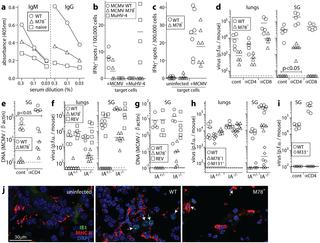PLoS Pathogens ( IF 6.7 ) Pub Date : 2018-02-15 , DOI: 10.1371/journal.ppat.1006905 Joseph Yunis , Helen E. Farrell , Kimberley Bruce , Clara Lawler , Stine Sidenius , Orry Wyer , Nicholas Davis-Poynter , Philip G. Stevenson

|
Cytomegaloviruses (CMVs) persistently and systemically infect the myeloid cells of immunocompetent hosts. Persistence implies immune evasion, and CMVs evade CD8+ T cells by inhibiting MHC class I-restricted antigen presentation. Myeloid cells can also interact with CD4+ T cells via MHC class II (MHC II). Human CMV (HCMV) attacks the MHC II presentation pathway in vitro, but what role this evasion might play in host colonization is unknown. We show that Murine CMV (MCMV) down-regulates MHC II via M78, a multi-membrane spanning viral protein that captured MHC II from the cell surface and was necessary although not sufficient for its degradation in low pH endosomes. M78-deficient MCMV down-regulated MHC I but not MHC II. After intranasal inoculation, it showed a severe defect in salivary gland colonization that was associated with increased MHC II expression on infected cells, and was significantly rescued by CD4+ T cell loss. Therefore MCMV requires CD4+ T cell evasion by M78 to colonize the salivary glands, its main site of long-term shedding.
中文翻译:

小鼠巨细胞病毒降解II类MHC从而在唾液腺中定殖
巨细胞病毒(CMV)持续和系统地感染具有免疫能力的宿主的髓样细胞。持久性意味着逃避免疫,而CMV通过抑制MHC I类限制性抗原呈递而逃避CD8 + T细胞。骨髓细胞还可以通过II类MHC(MHC II)与CD4 + T细胞相互作用。人类CMV(HCMV)在体外攻击MHC II呈递途径,但是这种规避可能在寄主定居中发挥什么作用尚不清楚。我们显示,鼠CMV(MCMV)通过M78,下调MHC II,M78是跨膜的跨膜病毒蛋白,可从细胞表面捕获MHC II,尽管它不足以在低pH内体中降解,但它是必需的。M78缺失的MCMV下调了MHC I,但没有下调MHC II。鼻内接种后,它在唾液腺定植中显示出严重缺陷,这与感染细胞上MHC II表达的增加有关,并通过CD4 + T细胞的丢失而得到了明显的挽救。因此,MCMV要求M78逃避CD4 + T细胞,以使唾液腺定居,这是其长期脱落的主要部位。



























 京公网安备 11010802027423号
京公网安备 11010802027423号